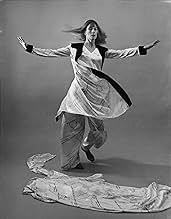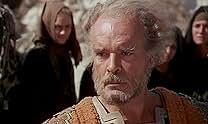IMDb RATING
6.9/10
1.8K
YOUR RATING
The women of Troy face enslavement after the fall of their city.The women of Troy face enslavement after the fall of their city.The women of Troy face enslavement after the fall of their city.
- Director
- Writers
- Stars
- Awards
- 2 wins total
Pat Beckett
- Woman
- (as Pat Becket)
Elsie Pittas
- Woman
- (as Ersie Pittas)
María García Alonso
- Woman
- (as Maria G. Alonso)
Nilda Álvarez
- Woman
- (as Nilda Alvarez)
- Director
- Writers
- All cast & crew
- Production, box office & more at IMDbPro
6.91.8K
1
2
3
4
5
6
7
8
9
10
Featured reviews
10olarko
Classic Tragedy Classically Produced and Performed
You must understand the form of classical tragedy to appreciate truly this film. Then you will see that Cacoyannis does, his four major actresses do, and the rest of his cast do, right down to the boy who plays Redgrave's son.
The four actresses have tragic arias -- there is no better word for it -- that they play magnificently. One always knows what is going on in this film because the text is translated so perfectly; the direction is so clear; and the actors play directly to that text. All are brilliant.
Don't look for special effects; there are none. Greek tragedy needed none. There are no chariot chases, no blowing up of the Parthenon as two smart-assed "detectives" grin and compliment each other, no two heroines outwitting all the police in the district and end up driving their chariot into a handy canyon. Sorry, gang, the play's the thing here -- and what a play and how well it is produced and performed.
If you love classics -- text, acting, and production, don't miss this one for any reason!
The four actresses have tragic arias -- there is no better word for it -- that they play magnificently. One always knows what is going on in this film because the text is translated so perfectly; the direction is so clear; and the actors play directly to that text. All are brilliant.
Don't look for special effects; there are none. Greek tragedy needed none. There are no chariot chases, no blowing up of the Parthenon as two smart-assed "detectives" grin and compliment each other, no two heroines outwitting all the police in the district and end up driving their chariot into a handy canyon. Sorry, gang, the play's the thing here -- and what a play and how well it is produced and performed.
If you love classics -- text, acting, and production, don't miss this one for any reason!
FILM IT AGAIN, PLEASE
This is a remarkably ineffectual filming of Euripides' magnificent examination of the effects of war on women. Euripides embarrassed Athens with his realism and blatant theatricality, neither of which is on view here. The four-star cast intone their limes reverently, as if reading holy scripture, never becoming real women watching their city burn and awaiting slavery and rape. The staging is stiff and posey,farther distancing a viewer from emotional involvement. The translation is stiff and respectful. One might say that this great play is here respected to death. In short, the film shows astonishingly little invention or imagination. And how is it that all the women of Troy managed to dress in identical matching rags? This is the only film of this immortal play. Someone with feeling and passion, film it again, please.
7kgm3
Moving
This is a film of truly Great Actresses. Without a doubt, Hepburn, Boujold, and Redgrave make this film worth seeing. Hepburn, as always, carries the show with ease. Redgrave and Boujold both claim smaller roles, but with a lasting impact. Boujold in particular delivers a haunting interpretation of Cassandra. The script its self is a decent adaptation of a first-class play, and by its self would rank at around a C in my books, but the incredible performances of the actresses bring the movie to life and raise my opinion of the movie to a B. Their performances along with the moving story they tell makes it easy enough to look over the one or two poorly directed scenes or the occasional overly dramatic moment.
Victims of War go thru hell, thereafter
Mr. Rodriquez comment "your outlook on the horrors of war will never be the same" is so true. The only movie that explains it best is Trojan Women. As a victim of WWII the movie is the only thing that truly explains the horrible experience. Once you are a victim of War and no one helps, you continue to be a victim. One is left alone without the familiar support system like family, language and ethnic group. Under all the humiliation and tragedies, you keep saying to yourself "this is so unfair cause I did nothing to deserve this, I merely was born. Whoever came up with the idea: All is fair in love and WAR, must have been a sadistic and selfish human being. Please watch Trojan Women because it is a must for ending wars.
beautiful
This film was shown at my art school in the early 90s to accompany reading the Greek play for class. It is beautifully produced -- the location and the lighting is exquisite, and makes the characters achingly beautiful in the midst of the tattered, gritty, treacherous war being waged around them. This film appears to be timeless...the cinematography is perfect; it does not appear to be an "old" or 'historical' film, and this luminescent quality helps younger viewers focus on the story (rather than struggle with history or epic readings or overlooking outdated film techniques). In fact, the movie is so well made, and the women appear so fresh and real, that as a college student I had no idea this movie was made in the early 70s, until I read a screen bio of Redgrave and was shocked that the movie is several decades "old." The viewer is pulled into the landscape by the profoundly beautiful Mediterranean surroundings, the intense acting, and raw emotionality the actors portray. This production successfully creates the ancient Greek ideal of tragedy, where the viewer experiences some personal transformation along with the characters. Quite memorable, even 15 years after seeing it -- and worth the time investment for a longer film.
Did you know
- TriviaThe Edith Hamilton translation of "The Trojan Women", which is used in this film, premiered on the Broadway stage in 1938. It was immediately acclaimed as being superior to the antiquated Gilbert Murray translation, which was the standard version used then.
- GoofsWhen Queen Hecuba cradles the dead body of her grandson Astyanax' corpse, actor Alberto Sanz' belly is seen moving up and down, showing he is still very much alive.
- Alternate versionsPortuguese version, "As Troianas", runs 109 minutes, with original soundtrack and Portuguese subtitles, as approved by the Government censorship.
- ConnectionsFeatured in Katharine Hepburn: All About Me (1993)
- How long is The Trojan Women?Powered by Alexa
Details
Box office
- Gross US & Canada
- $110,428
Contribute to this page
Suggest an edit or add missing content































